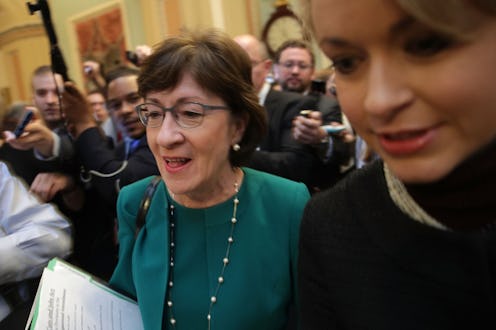News
This Female Senator Says People Are Criticizing Her Tax Vote For A Gross Reason

On Tuesday, as she faced down criticism of her decision to vote "yes" on the controversial Republican tax bill, Sen. Susan Collins (R-ME) hit back at her critics in a big way. Specifically, Collins said the media's tax bill coverage was "sexist." She suggested that the negotiations that got her to a place where she felt comfortable voting for the tax overhaul have been unfairly singled out for criticism just because she's a woman.
Many of her critics, however, are making a different case: that the Maine senator took GOP leadership at its word on some promises that they aren't going to be fulfilled. Collins had agreed to vote for the bill in return for what she once called an "ironclad" promise from Republican leadership that they'd hold a vote on stabilizing the health insurance markets. But on Wednesday, Collins admitted that it's not going to happen. Instead, the GOP reportedly will take up the issue of the health insurance markets early next year — or at least, that's what congressional leaders are claiming now.
Collins made the remarks about "sexism" Tuesday on Capitol Hill, hours prior to voting "yes" on the deeply unpopular tax bill. She was reportedly asked a question about House Republicans who said they wouldn't accept the deal she struck with Senate Majority Leader Mitch McConnell in exchange for her vote.
In response to that question, she accused the media of covering her negotiations in a sexist manner and insisted that people were ignoring what she'd already achieved:
I believe that the coverage has been unbelievably sexist, and I cannot believe that the press would have treated another senator with 20 years of experience as they have treated me. They’ve ignored everything that I’ve gotten and written story after story about how I’m duped. How am I duped when all your amendments get accepted?
Collins also pointed to a story in The New York Times that said she "didn't cry" during a meeting with people protesting the tax bill, a description she says never would have been used for a male legislator. She reportedly requested that the phrasing be removed from the Times article ― and it was.
Ady Barkan, one of the most visible and outspoken of the protesters making the rounds in Congress and who suffers from the terminal neurodegenerative disease ALS, reportedly said that Collins wouldn't vote for the bill "if she saw me as human." Protesters have focused on the bill's massive upward redistribution of wealth, as well as the negative impact it could have on the health care system. The tax bill repeals the Affordable Care Act's individual mandate.
Collins believes the media is holding her to a double-standard, owing both to the tone of the coverage of her vote and the extent to which people fixated on her decision-making process, instead of that of other senators. Regardless of whether she's gotten more criticism than her male colleagues, however, there's at least one very notable reason her vote drew so much attention.
After she and Sen. Lisa Murkowski (R-AK) came together with Sen. John McCain (R-AZ) to scuttle Republicans' efforts to repeal of the Affordable Care Act, Collins is considered a swing vote on hotly contested pieces of legislation. The fact that she broke with the rest of her party to defeat the GOP health care bill led many people to believe she wouldn't vote for a tax bill that strips away the health care law's very foundation: the individual mandate.
That's why it was so unexpected for Collins to vote "yes" on the tax bill. Her vote drew outrage from many of the same people who praised her for voting "no" on ACA repeal earlier this year. As it stands now, the GOP tax bill is headed to President Donald Trump's desk and will become law once he signs it.
As far as the polls have shown, the tax bill is not a popular piece of legislation. Fifty-five percent of Americans oppose it, compared to just 33 percent who support it. A large chunk of Americans, 63 percent, also said that they believe the bill was primarily written to benefit the wealthy and corporations, according to a recent NBC News/The Wall Street Journal poll. So whatever the exact sources of the criticism Collins has received in the last 24 hours may be, the controversy isn't likely to die down anytime soon.